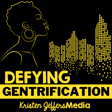
Resourcefulness and Reparations in North Carolina with Christine Edwards
This week on the podcast, I'm joined by Christine Edwards of Civility Localized, a Charlotte-based public engagement firm that is changing the game on so many levels.
But most of all, this is an episode of two Black Southern women who are connected in some shape or form to North Carolina, talking about how we both are motivated and have or haven’t been supported by that state.
About our Guest
Christine Edwards is a civic firebrand who has immersed herself in helping urban communities grow with dignity. Since founding Civility Localized in 2018, her work has affected change nationwide through innovative outreach strategies that support racial equity, reducing barriers to participation, and encouraging sustainable growth for cities. Christine earned her Master of Public Administration with a concentration in Urban Management and Policy from UNC Charlotte. Christine’s work has been featured in Fast Company, Axios, The Business Journals, Queen City Nerve, Mountain Xpress, Pride Magazine, QCity Metro and many other local and national publications. Christine serves as a board member for Generation Nation, an organization cultivating the next generation of civic leaders and is a member of the board of directors for the Humane Society of Charlotte. She enjoys southern food, and loves seeing urban policy theory play out in daily life.
- Social Media & Websites:
- Websites:
- https://www.CivilityLocalized.com
- https://www.CivicImpactAcademy.com
- https://www.MeetChristine.co
- Facebook: https://facebook.com/civilitylocalized
- LinkedIn: https://www.linkedin.com/company/civility-localized/
- Twitter: @CivilityCo
- Instagram: @CivilityLocalized
- Websites:
Also, I had to have an NC-related hot topic this week and it’s about this new mask and protest banning bill, that’s just the latest of laws making me not want to move home again, despite my love and homesickness.
Read the reference article here — https://www.wral.com/story/nc-senate-votes-to-ban-people-from-wearing-masks-in-public-for-health-reasons/21433199/
And I found two Black North Carolina authors for you to read this week, you can purchase then in my Bookshop.org store:
https://bookshop.org/a/5060/9781982163693
https://bookshop.org/a/5060/9780679737889
Never miss an episode, subscribe to my Substack or on LinkedIn
You can also find me, Kristen , @blackurbanist or @kristpattern.

